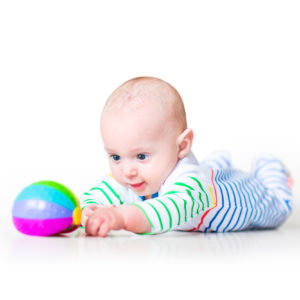Competence
Competence is when your baby builds a wide set of skills that they can use as new adventures come their way. Although their independence may seem limited during the first year of life, there are many ways that you can encourage them. Reaching developmental milestones, such as rolling over, holding their bottle, and walking, all work to build their sense of mastery. Follow their lead and give support along the way.
You may feel like you need to help your little one with everything, and that’s true…for the most part.

Let your baby have some tummy time – even for just a few minutes. Lay in front of them or place a colorful toy near them to entertain them.

Give your baby the chance to self-soothe. As they realize that they can calm themselves, they will become better at handling strong emotions.

Let your child experiment with ways to grab a toy that is just out of their reach. Let them lean, reach, scooch, or crawl!

Have your 10-month-old try using their thumb and index finger to feed themselves, and make sure to encourage their efforts!
Did you know?
Tummy time helps newborns build motor skills that they’ll need later on when they start to crawl and walk.
Practice, Practice, Practice!
Let your baby try different tasks without too much assistance from you so they can develop important skills that they’ll need throughout childhood.
- Have your baby put toys into a container, such as a bowl. It may take a while for them to get it, but this will build their fine motor skills, sense of mastery, and ability to handle frustration.
- Remember, doing tasks for them to “make things easier” will actually make things harder for them (and you) in the long run. Resist the urge to jump in and be patient while they figure it out!
Create opportunities for them to do the same task multiple times to help them feel like they’ve mastered it. Then, find small ways to slightly change the task to encourage growth and learning.
- When your 8-month-old can pick up small pieces of food, make it a little harder by giving them slippery food, like pasta with sauce or butter.
Make time for your little one to test out their own abilities. It’s important for them to use their body to explore – tasting, smelling, touching, listening, seeing – the world around them. Let them:
-
- Play with their toes during diaper changes.
- Cover their eyes to play peek-a-boo.
- Hit two blocks together to make “music.”
- Communicate what they want by using simple words or nonverbal signs, like pointing their finger.
